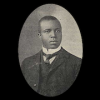
Among her many pursuits, pianist/NPR host/activist Lara Downes recently started her own record label, Rising Sun Music, which has spawned a bunch of projects aimed toward promoting music by Black composers. You might argue that the subject of her latest album, Reflections: Scott Joplin Reconsidered, doesn’t require additional promotion, but Scott Joplin’s position in musical and social history does fit comfortably into her agenda.
Joplin’s rags were the rage of their time, around the turn of the 20th century, a harbinger of the jazz that was soon to come. Yet being a Black composer, Joplin could only go so far toward fulfilling the breadth of his ambitions — and the failure of his opera Treemonisha after a single barebones run-through broke his spirit. The emergence of the more vigorous stride piano style and New Orleans contrapuntal ensemble jazz eclipsed ragtime after Joplin’s death, consigning it for decades to the lockbox of nostalgia, played in pizza parlors at breakneck tempos that he would have despised.

The pianist/musicologist Joshua Rifkin — he of The Baroque Beatles Book — started the first Joplin revival around 1970 with a pair of hot-selling albums that startled some with their relaxed feeling as per Joplin’s instructions: “Do not play this piece fast. It is never right to play ragtime fast.” Then Gunther Schuller and his New England Conservatory Ragtime Ensemble revved up the revival with orchestrations for the album The Red Back Book, and Marvin Hamlisch sealed it with his adaptations for the hit film The Sting. Star performers like Itzhak Perlman and Jean-Pierre Rampal rushed to cover Joplin rags, and Treemonisha got on the boards at last, hailed by many, given the deluxe boxed-LP-set treatment by Deutsche Grammophon. All of this had the effect of reclassifying Joplin as a serious classical composer with a broad appeal that would soon acquire the label “crossover.”
Joplin’s music was dangerously overplayed during the peak years of the first revival, and things eventually simmered down. But now that enough time has passed, and given the current explosive growth of interest in Black composers, we may be in for a second Joplin revival. This is where the ever-enterprising Downes comes in with a view of Joplin through several prisms, a mix of solo piano numbers, duets, and small-band arrangements.
Downes’s solo performances of the rags are generally in the range of the refined Rifkin manner, though with more pep and a bit more pronounced emphasis on the syncopation than Rifkin’s performances. She tries something unusual with “Eugenia,” producing a brittle plucking sound like a prepared piano imitating a banjo.
The “Maple Leaf Rag” is treated to a saucy arrangement for string quartet and Kevin Sun’s clarinet, ending with what sounds like a champagne cork pop, followed by a giggle. The group waxes sentimental in “Bethena” and glides serenely through Joplin’s last composition, “Magnetic Rag. The inevitable “The Entertainer,” which for me has worn out its welcome through overexposure, is set in a cutesy arrangement for Downes and mandolinist Joe Brent.
There is one selection that is tagged as a “world premiere recording,” “A Picture of Her Face” — an early song, one of his first two published works, that is little more than a forlorn salon piece, sung in that spirit by baritone Will Liverman. The main function of this strikes me as an example of Joplin writing what he thought the public would like to hear circa 1895, four years before the “Maple Leaf Rag” emerged in print.
The album is bookended by excerpts from Treemonisha — a pensive solo piano arrangement of the Prelude by Downes to lead off the record and the opera’s finale, “A Real Slow Drag,” with the Brooklyn Youth Chorus and a string quartet, gently closes the album. It’s quite charming, if a far cry from the grandiose way a full production of the opera ends.
To sum it all up, Downes doesn’t really change perceptions of Joplin in these “reconsiderings,” but she does wrap up the multiple facets of his world in a concise package.




